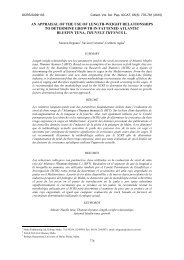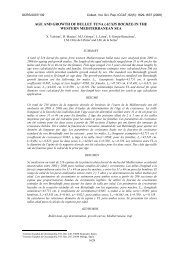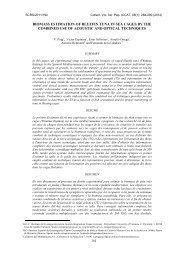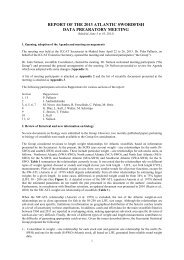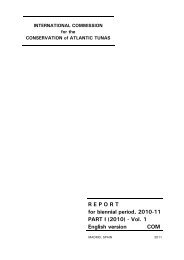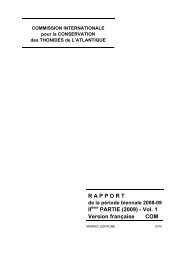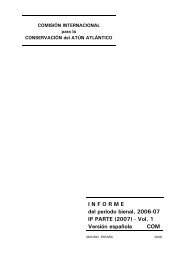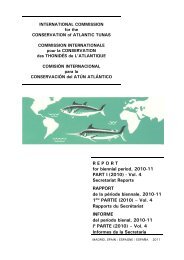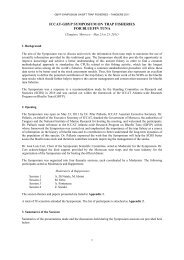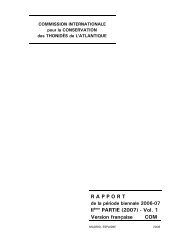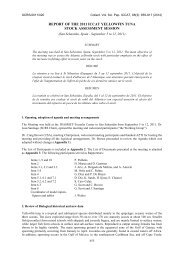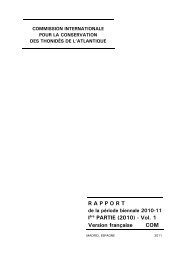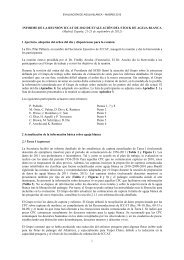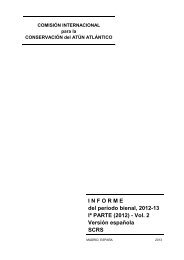E - Iccat
E - Iccat
E - Iccat
Create successful ePaper yourself
Turn your PDF publications into a flip-book with our unique Google optimized e-Paper software.
OPENING ADDRESSES & STATEMENTS<br />
For the year 2003, Trinidad and Tobago exerted considerable effort to ensure that its catch limit for North<br />
Atlantic swordfish of 125 t was not exceeded having regard to our past situation of overage. In 2002, and<br />
consistent with the ICCAT Recommendation [Ref. 02-02] relating to the rebuilding program for North Atlantic<br />
swordfish, Trinidad and Tobago succeeded in obtaining an increase in its catch limit for North Atlantic<br />
swordfish from 87 to 125 t. This was due to the increase in the Total Allowable Catch for North Atlantic<br />
swordfish based on the 2002 SCRS Report. Trinidad and Tobago informed the Commission that its swordfish<br />
fishery was in a state of overage, the 2002 catch of swordfish amounting to 92 t and the catch limit of 87 t having<br />
been exceeded for that year. At the 2002 Commission Meeting, Trinidad and Tobago proposed to eliminate its<br />
existing overage during the period 2003-2004, thereby reducing its annual catches in 2003 and 2004 to an<br />
amount lower than the proposed catch limits for those years. Trinidad and Tobago is satisfied that it has met this<br />
objective in 2003. Our swordfish catches were capped at 75 t in 2003 and fishing for this species by the industry<br />
was not permitted once this catch limit had been reached. Our actions in 2003, therefore, have conformed to our<br />
proposal to eliminate the situation of overage in our North Atlantic swordfish fishery.<br />
The minimum size tolerance level of 15% for North Atlantic swordfish continued to pose a daunting challenge.<br />
This level was exceeded by 3% in 2003. Trinidad and Tobago fully supports the recommendation pertaining to<br />
the minimum size tolerance level, as this is an essential component for the management and conservation of this<br />
species. However, as pointed out at the 2003 meeting, our national longline fleet operates within out Exclusive<br />
Economic Zone and not on the high seas. Trinidad and Tobago intends to pursue an investigation into the fishing<br />
areas and the impacts of the gear used by our longline fleet on the capture of undersized fish and to put the<br />
appropriate management measures in place. Trinidad and Tobago wishes to reiterate that these undersized<br />
swordfish are sold locally since the minimum size regulations preclude the export of undersized fish to<br />
international markets.<br />
Trinidad and Tobago has taken action consistent with ICCAT Recommendation [Ref. 02-13] to amend the plan<br />
to rebuild blue marlin and white marlin populations. There are four major sport fishing tournaments that are held<br />
annually in Trinidad and Tobago which target these species. A tag and release system is promoted at these<br />
competitions and sport fishermen are awarded more points for release of these species. On the other hand, they<br />
are penalized for presenting blue marlin, white marlin or sailfish at the scales below a certain minimum eligible<br />
size. This action ensures that the sport fishing tournaments are conducted in a manner consistent with ICCAT´s<br />
management recommendations.<br />
In 2002, Trinidad and Tobago sought clarification with respect to the process of compilation of the list of IUU<br />
fishing vessels and we note with satisfaction that this was adequately addressed at the 2002 Commission<br />
meeting. We operate a transshipment port for tunas and tuna-like species as part of our port State responsibility.<br />
Trinidad and Tobago intends to implement measures through a Memorandum of Agreement with these<br />
companies, which would be given the force in law to ensure that all relevant data and information on these<br />
vessels are submitted to the national fisheries authorities.<br />
With respect to our national longline fleet, a Trip Reporting System is fully operational and the industry is fully<br />
supportive of this management measure. Thus, in 2003 we have taken all necessary measures to ensure that the<br />
actions of our longline fleet do not diminish ICCAT conservation and management measures. We wish to thank<br />
the Commission for affording us this opportunity to address this meeting and reiterate our immense pleasure at<br />
being present in this delightful city of Dublin.<br />
Turkey<br />
I am pleased and honored to address on behalf of the Turkey at the Eighteenth Regular Meeting of the<br />
International Commission for the Conservation of Atlantic Tunas.<br />
Since 1992, Turkey has attended the ICCAT meetings as an observer. In September 2003, Turkey attended the<br />
SCRS meeting as a full member of ICCAT.<br />
Today I am very pleased to advise that Turkey is here as full member of ICCAT. We are conscious of the<br />
responsibilities of becoming a member of ICCAT as we were before.<br />
Turkey, with a coastline of 8,333 km on the Black Sea, Sea of Marmara, Aegean Sea and the Mediterranean Sea,<br />
is dependent on tuna fisheries. For about 10,000 years bonitos and bluefin tuna have been living in Turkish<br />
waters. Writers of old have reported on the bonitos and bluefin tunas in the Bosphorus and Dardanelles. The<br />
name Golden Horn (Halic) actually comes from the large numbers of these fish that are present in these habitats.<br />
63



